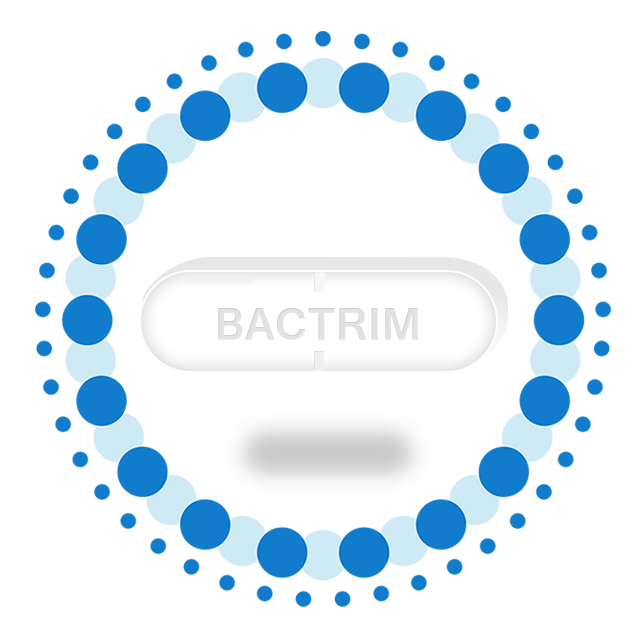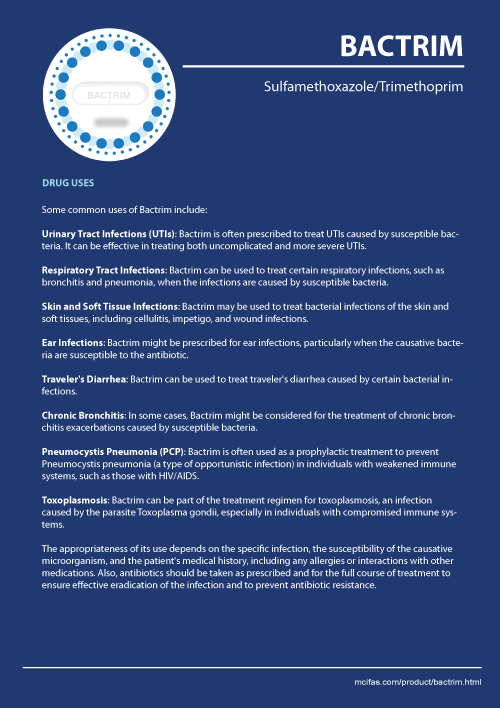Bactrim Prescribing Information
This medicine is a combination of sulfamethoxazole and trimethoprim. Both the components are used to treat different types of infections caused by bacteria. It is also known as sulfamethoxazole and trimethoprim or co-trimoxazole. It was first sold in the year 1974 and one of the most effective and safe medicine. It is widely available and not very costly.

Uses of Bactrim
Some common uses of Bactrim include:
- Urinary Tract Infections (UTIs): Bactrim is often prescribed to treat UTIs caused by susceptible bacteria. It can be effective in treating both uncomplicated and more severe UTIs.
- Respiratory Tract Infections: Medicine can be used to treat certain respiratory infections, such as bronchitis and pneumonia, when the infections are caused by susceptible bacteria.
- Skin and Soft Tissue Infections: Bactrim may be used to treat bacterial infections of the skin and soft tissues, including cellulitis, impetigo, and wound infections.
- Ear Infections: Bactrim might be prescribed for ear infections, particularly when the causative bacteria are susceptible to the antibiotic.
- Traveler's Diarrhea: Drug can be used to treat traveler's diarrhea caused by certain bacterial infections.
- Chronic Bronchitis: In some cases, Bactrim might be considered for the treatment of chronic bronchitis exacerbations caused by susceptible bacteria.
- Pneumocystis Pneumonia (PCP): This antibiotic is often used as a prophylactic treatment to prevent Pneumocystis pneumonia (a type of opportunistic infection) in individuals with weakened immune systems, such as those with HIV/AIDS.
- Toxoplasmosis: Bactrim can be part of the treatment regimen for toxoplasmosis, an infection caused by the parasite Toxoplasma gondii, especially in individuals with compromised immune systems.
The appropriateness of its use depends on the specific infection, the susceptibility of the causative microorganism, and the patient's medical history, including any allergies or interactions with other medications. Also, antibiotics should be taken as prescribed and for the full course of treatment to ensure effective eradication of the infection and to prevent antibiotic resistance.
Dosage
The dosage of Bactrim can vary depending on the specific infection being treated, the severity of the infection, the patient's age and weight, and other factors. It's crucial to follow the dosing instructions provided by your healthcare provider or as indicated on the prescription label. Never adjust your dosage without consulting a medical professional. Some general dosage guidelines:
For Adults:
- For most bacterial infections: The typical dosage is one Bactrim DS tablet (containing 800 mg of sulfamethoxazole and 160 mg of trimethoprim) every 12 hours or two regular Bactrim tablets (each containing 400 mg of sulfamethoxazole and 80 mg of trimethoprim) every 12 hours.
- For Pneumocystis pneumonia prophylaxis in individuals with HIV/AIDS: The usual dose is one Bactrim DS tablet once a day.
For Children:
- Bactrim dosages for children are usually based on weight and should be determined by a pediatrician. The dosages are generally calculated as a certain amount of the medication per kilogram (kg) of the child's body weight.
It's important to keep in mind that individual cases can vary, and the dosages might differ based on specific factors such as the patient's renal function, allergies, and other medical conditions.
If you miss a dose, take it as soon as you remember, but if it's close to the time for your next dose, skip the missed dose and resume your regular dosing schedule. Never take a double dose to make up for a missed one.
Additionally, completing the full course of treatment as prescribed by your doctor is crucial, even if you start to feel better before the medication is finished. This helps ensure the infection is fully treated and reduces the risk of antibiotic resistance.
Side Effects of Bactrim
It is necessary to be aware of all side effects associated with this medicine. It is not necessary that all patients will report side effects, however some patients can. Some of these side effects can be life threatening if not treated in time. Side effects such as allergic reaction, swelling of the body or hives should be treated immediately. Apart, from these there can be other side effects as well:
- Cold
- Flu symptoms
- Pale skin
- Sudden weakness
- Chills
- Sore throat
- Unable to concentrate
- Short of breath
- Swollen gums
- Mouth sores
- Skin sores
- Cough
- Liver problems
- Stomach pain
- Discolored urine
- Jaundice
- Skin pain
- Burning sensation in the eyes
- Vomiting
- Feeling unsteady
Get immediate medical help for all of the above side effects. Also, there are some common side effects:
- Nausea
- Mild itching
- Loss of appetite
These side effects may not need immediate attention, however, do report them to your doctor.
Interaction with other drugs
Bactrim can interact with other drugs and substances, potentially affecting its effectiveness or causing adverse effects. Here are some examples of interactions:
- Warfarin: Bactrim can increase the effects of the anticoagulant (blood-thinning) medication warfarin, potentially leading to an increased risk of bleeding. Regular monitoring of your blood clotting factors may be necessary if you're taking both drugs.
- Methotrexate: The combination of Bactrim and methotrexate (used to treat conditions like rheumatoid arthritis and certain cancers) can lead to increased methotrexate levels in the body, increasing the risk of side effects.
- Phenytoin: Antibiotic can raise the levels of the anti-seizure medication phenytoin in the blood, potentially leading to increased side effects.
- Sulfonylureas: Bactrim can enhance the effects of certain diabetes medications, like sulfonylureas, potentially causing low blood sugar levels.
- ACE Inhibitors and ARBs: Bactrim can increase the levels of some blood pressure medications (angiotensin-converting enzyme inhibitors and angiotensin II receptor blockers), potentially leading to elevated levels of potassium in the blood.
- Diuretics: Bactrim can interact with diuretics, affecting potassium levels and potentially leading to imbalances in electrolytes.
- Digoxin: Bactrim can increase levels of the heart medication digoxin, which can lead to digoxin toxicity.
- Cyclosporine: This medicine can increase the levels of the immunosuppressive drug cyclosporine, increasing the risk of side effects.
- Mouth Ulcer Medications: Bactrim can interact with oral ulcer medications like benzydamine, leading to increased side effects.
- Certain Antidepressants: Bactrim can interact with tricyclic antidepressants, potentially increasing the risk of serotonin syndrome (a potentially life-threatening condition).
What to avoid while on Bactrim
While taking Bactrim, there are certain precautions you should take and things you should avoid to ensure the medication's effectiveness and reduce the risk of adverse effects. Here are some things to avoid while on this drug:
- Alcohol: It's generally recommended to avoid alcohol while taking antibiotics like Bactrim. Alcohol can potentially interfere with the effectiveness of the medication and may increase the risk of side effects or interactions.
- Excessive Sun Exposure: Bactrim can make your skin more sensitive to sunlight, increasing the risk of sunburn. Avoid prolonged sun exposure and use sunscreen, protective clothing, and sunglasses when outdoors.
- Dehydration: Medicine can potentially affect your electrolyte balance, particularly potassium levels. To prevent dehydration and electrolyte imbalances, make sure to drink an adequate amount of fluids while taking the medication.
- High-Potassium Foods and Supplements: Antibiotic can affect potassium levels in the body. If you're taking Bactrim, it's a good idea to avoid excessive consumption of high-potassium foods and supplements, especially if you have kidney problems.
- Other Medications: Inform your healthcare provider about all the medications, supplements, and herbal products you are taking. Some drugs may interact with Bactrim, potentially affecting its effectiveness or causing adverse effects.
- Antacids and Supplements: Some antacids, vitamins, and mineral supplements can interact with Bactrim and reduce its absorption. If you need to take these supplements, consider spacing them apart from your doses.
- Driving and Operating Machinery: Bactrim can sometimes cause dizziness or drowsiness. If you experience these side effects, avoid driving or operating heavy machinery until you know how the medication affects you.
- Allergies and Sensitivities: If you are allergic to sulfa drugs or have experienced allergic reactions to Bactrim in the past, avoid using it. It's important to discuss any allergies or sensitivities with your healthcare provider.
- Skipping Doses: To ensure the effectiveness of Bactrim in treating your infection and preventing medicine resistance, it's crucial to take the medication exactly as prescribed. Avoid skipping doses or stopping the medication prematurely.
- Processed and Spicy Foods: Some individuals might experience gastrointestinal upset while taking Bactrim. If you're prone to stomach upset, consider avoiding excessively spicy or processed foods.
Contraindications of Bactrim
Bactrim should not be advised for patients who have a history of liver or kidney disease. Doctor would like to know your medical history and it is advisable that you let them the complete details. Also, patients with anemia caused by a deficiency of folic acid, low blood platelets, asthma, allergies, HIV or thyroid disorder need to consult a doctor before taking this medicine. This will help the doctor give the correct medicine or even a change of medicine if required. This medicine is not safe for children below the age of 2 months. Older adults are more susceptible to side effects because of this medicine. The chances increase manifold if you are on digoxin or certain diuretics. Never take the medicine beyond the prescribed amount. Overdose of this medicine can have serious side effects. Follow the doctor`s instructions as per the prescription. Even if your symptoms are improved do not stop using this medicine. If you skip the dose it may result in infection which is resistant to antibiotics. Some other test results can have unusual results while using this medicine. Patients have also reported kidney stones while using this medicine. It is advised to drink lots of water to prevent it. Meet with your doctor regularly to understand the improvement made while using this medicine.
Pregnancy and Bactrim
Bactrim can be harmful to an unborn baby. This medicine should not be taken while you are pregnant. You can talk to your doctor for effective birth control measures. The medicine is also found in breast milk of nursing mothers. This can be harmful for the baby. Consult your doctor on this.
» Drug Uses (format pdf, 0.2 Mb)



